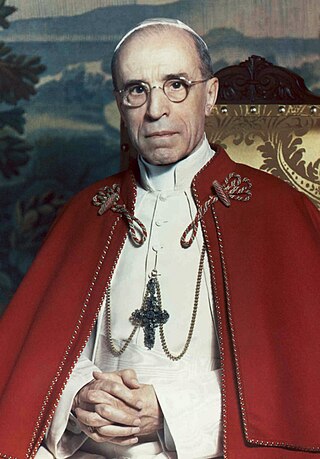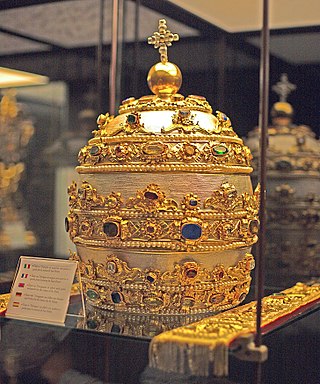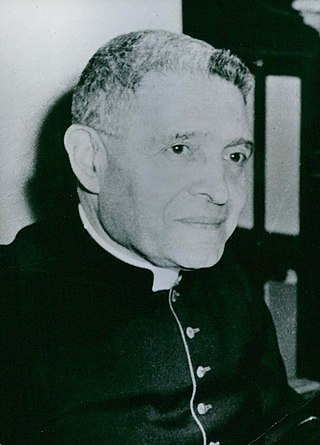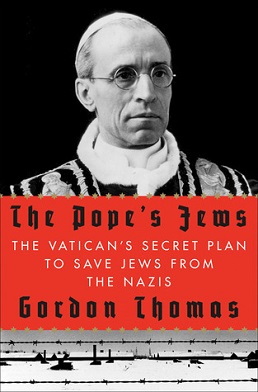This article needs additional citations for verification .(March 2018) |
 | |
| Author | Malachi Martin |
|---|---|
| Publisher | Putnam |
Publication date | 1981 |
The Decline and Fall of the Roman Church is a 1981 non-fiction book by Catholic priest and author Malachi Martin.
This article needs additional citations for verification .(March 2018) |
 | |
| Author | Malachi Martin |
|---|---|
| Publisher | Putnam |
Publication date | 1981 |
The Decline and Fall of the Roman Church is a 1981 non-fiction book by Catholic priest and author Malachi Martin.
Martin wrote this book to analyse the sudden and rapid decline of the Roman Catholic Church in its ecclesiastical organization and doctrinal unity since the Second Vatican Council (1962–1965).
The book is an account of the history of the Roman Catholic Church progressing from the earliest beginnings and Roman Emperor Constantine the Great's relationship with the church during the reign of Pope Silvester I up through the post Vatican II popes and Pope John Paul II.
Martin shows the transformations that took place in the institution of the papacy as the relationship between temporal power and spiritual authority was worked out throughout the years. Martin tells how the early popes were chosen, including how many were appointed by secular rulers until the invention of the conclave.
The last two chapters of the book—concerning popes Pius XII and John Paul II—give background information on recent papal history from Martin's perspective. The Pius XII chapter contains information on both the pope's encounter with Marxism and his visionary life. Martin, was a protégé to Pius' confidant and confessor, cardinal Augustine Bea, who was the source for this information.
The book was translated into Spanish, French and German.[ citation needed ]
Reviews of the book noted its controversial character. Kirkus Reviews called it a "Vivid, impressionistic, chimerical history of the papacy" and concluded that it was "Lively stuff, certainly, but rife with distortions." [1] Christopher Small of the Glasgow Herald characterized it as a "highly dramatised, not to say sensational, tour through the history of the papacy", the author's main purpose being to depict what he sees as the church's long and problematic association with state power. [2] On the other hand, National Catholic Reporter journalist Peter Hebblethwaite found parts of the book to be "incoherent" and "dogmatic" and wrote that Martin "seems to be making it all up". [3]

Pope John XXIII was head of the Catholic Church and sovereign of the Vatican City State from 28 October 1958 until his death in June 1963.

Pope Pius XII was head of the Catholic Church and sovereign of the Vatican City State from 2 March 1939 until his death in October 1958. Before his election to the papacy, he served as secretary of the Department of Extraordinary Ecclesiastical Affairs, papal nuncio to Germany, and Cardinal Secretary of State, in which capacity he worked to conclude treaties with various European and Latin American nations, including the Reichskonkordat treaty with the German Reich.

Pope Paul VI was head of the Catholic Church and sovereign of the Vatican City State from 21 June 1963 to his death on 6 August 1978. Succeeding John XXIII, he continued the Second Vatican Council, which he closed in 1965, implementing its numerous reforms. He fostered improved ecumenical relations with Eastern Orthodox and Protestant churches, which resulted in many historic meetings and agreements. In January 1964, he flew to Jordan, the first time a reigning pontiff had left Italy in more than a century.

The papal tiara is a crown that is worn by popes of the Catholic Church from as early as the 8th century to the mid–20th century. It was last used by Pope Paul VI in 1963, and only at the beginning of his reign.
Malachi Brendan Martin, also known under the pseudonym of Michael Serafian, was an Irish-born American Traditionalist Catholic priest, biblical archaeologist, exorcist, palaeographer, professor, and writer on the Catholic Church.
In pectore is a term used in the Catholic Church for an action, decision, or document which is meant to be kept secret. It is most often used when there is a papal appointment to the College of Cardinals without a public announcement of the name of that cardinal. The pope reserves that name to himself. The Italian-language version of the phrase – in petto – is sometimes used. When the name of a new cardinal is announced or made public, it is sometimes said to be published.

Hitler's Pope is a book published in 1999 by the British journalist and author John Cornwell that examines the actions of Eugenio Pacelli, who became Pope Pius XII, before and during the Nazi era, and explores the charge that he assisted in the legitimization of Adolf Hitler's Nazi regime in Germany, through the pursuit of a Reichskonkordat in 1933. The book is critical of Pius' conduct during the Second World War, arguing that he did not do enough, or speak out enough, against the Holocaust. Cornwell argues that Pius's entire career as the nuncio to Germany, Cardinal Secretary of State, and Pope, was characterized by a desire to increase and centralize the power of the Papacy, and that he subordinated opposition to the Nazis to that goal. He further argues that Pius was antisemitic and that this stance prevented him from caring about the European Jews.

Domenico Tardini was a longtime aide to Pope Pius XII in the Secretariat of State. Pope John XXIII named him Cardinal Secretary of State and, in this position the most prominent member of the Roman Curia in Vatican City.
Under His Very Windows: The Vatican and the Holocaust in Italy is a book by Susan Zuccotti which examines the role of the Catholic Church in providing aid to Jews in Italy during the Holocaust, and is critical of the actions of the papacy in this regard.

According to Roman Catholicism, the history of the papacy, the office held by the pope as head of the Catholic Church, spans from the time of Peter to the present day.
The history of the Catholic Church is the formation, events, and historical development of the Catholic Church through time.

Holy See–Soviet Union relations were marked by long-standing ideological disagreements between the Catholic Church and the Soviet Union. The Holy See attempted to enter in a pragmatic dialogue with Soviet leaders during the papacies of John XXIII and Paul VI. In the 1990s, Pope John Paul II's diplomatic policies were cited as one of the principal factors that led to the dissolution of the Soviet Union.

Windswept House: A Vatican Novel is a 1996 novel by former Jesuit priest Malachi Martin. The novel details turmoil within the Catholic Church and corruption in Vatican City. Malachi alleged the novel depicted real events in the form a non-fiction novel similar to the works of Taylor Caldwell, or Truman Capote'sIn Cold Blood.

The papacy of Pius XII began on 2 March 1939 and continued to 9 October 1958, covering the period of the Second World War and the Holocaust, during which millions of Jews were murdered by Adolf Hitler's Germany. Before becoming pope, Cardinal Pacelli served as a Vatican diplomat in Germany and as Vatican Secretary of State under Pius XI. His role during the Nazi period has been closely scrutinised and criticised. His supporters argue that Pius employed diplomacy to aid the victims of the Nazis during the war and, through directing his Church to provide discreet aid to Jews and others, saved hundreds of thousands of lives. Pius maintained links to the German Resistance, and shared intelligence with the Allies, but at the same time he developed alliances with Nazi Germany and Fascist Italy and even arranged secret negotiations with Hitler's envoys. His strongest public condemnation of genocide was, however, considered inadequate by the Allied Powers, while the Nazis viewed him as an Allied sympathizer who had dishonoured his policy of Vatican neutrality.
Three Popes and the Jews is a 1967 book by Pinchas Lapide, a former Israeli Consul to Milan, who at the time of publication was a deputy editor in the Israeli Prime Minister's press office. The "three popes" are Pope Pius XII (1939–1958), Pope John XXIII (1958–1963), and Pope Paul VI (1963–1978).
Pius XII, The Holocaust, and the Cold War is a 2008 book by historian Michael Phayer which makes use of documents that had been released under US President Bill Clinton's 1997 executive order declassifying wartime and postwar documents.
The canonization process of Pope Pius XII dates to shortly after his death in 1958. He was declared a servant of God in 1990 and venerable in 2009. Father Peter Gumpel was the relator of Pius XII's cause for canonization. The potential beatification of Pius XII has raised concern, especially by Jewish organisations, because of his controversial record during the Holocaust. The objections especially arise because of the refusal by the Vatican to allow independent access to the Vatican's archives for the period of Pius XII's papacy.

During the Second World War, Pope Pius XII maintained links to the German resistance to Nazism against Adolf Hitler's Nazi regime. Although remaining publicly neutral, Pius advised the British in 1940 of the readiness of certain German generals to overthrow Hitler if they could be assured of an honourable peace, offered assistance to the German resistance in the event of a coup, and warned the Allies of the planned German invasion of the Low Countries in 1940. The Nazis considered that the Pope had engaged in acts equivalent to espionage.

The Pope's Jews: The Vatican's Secret Plan to Save Jews from the Nazis is a 2012 book by the British author Gordon Thomas concerning the efforts of Pope Pius XII to protect Jews during the Nazi Holocaust. The Observer reported in 2013 that "Gordon Thomas, a Protestant, was given access to previously unpublished Vatican documents and tracked down victims, priests and others who had not told their stories before" and had uncovered "evidence on Pius XII's wartime efforts to save Jewish refugees".